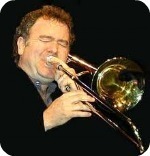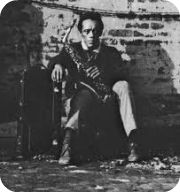Doug Ramsey's Blog, page 12
October 27, 2010
Other Matters: A Slice Of Autumn
October 26, 2010
Recent Listening: December 2nd Quartet
Some of the best new work of prominent American jazz artists is not on US labels, and not all of it is easy to find. The rising young trumpeter Dominick Farinacci is the fourth member. Benny Green is guest pianist on four of the 11 tracks. Recorded in California by the Vega label for the Japanese market, the album is available in the US as a pricey import unlikely to reach a wide audience. Still, connoisseurs have created a buzz about it.
The "stars" theme is hardly new, but it has rarely been pursued with more lyricism. DeRose's piano solos, pure delivery of lyrics and unison piano-vocalise improvisations are among the pleasures in jazz these days. Her work here is on the high level she has established with her recent CDs for MaxJazz, a stunning one-off duo collaboration with trumpeter Marvin Stamm and her hard-to-get first album with the December 2nd Quartet. DeRose's treatment of "A Dream is a Wish Your Heart Makes" could revive that barely-remembered song from the old Disney cartoon feature  "Cinderella." The veterans Drummond and Tana meld smoothly with DeRose and with Farrinacci, whose intriguing freshness of conception is set on a foundation that indicates close study of Blue Mitchell, Clifford Brown and Miles Davis. His duet with Benny Green on "Stardust" consists of Hoagy Carmichael's melody with slightbut most effectivevariations, a cadenza inspired by Brown and, throughout, a magic carpet of chords from Green. Green is on piano as DeRose sings and Farinacci solos on Fred Hersch and Norma Winstone's "Stars," a song that, despite its challenging intervals, could become a new standard.
"Cinderella." The veterans Drummond and Tana meld smoothly with DeRose and with Farrinacci, whose intriguing freshness of conception is set on a foundation that indicates close study of Blue Mitchell, Clifford Brown and Miles Davis. His duet with Benny Green on "Stardust" consists of Hoagy Carmichael's melody with slightbut most effectivevariations, a cadenza inspired by Brown and, throughout, a magic carpet of chords from Green. Green is on piano as DeRose sings and Farinacci solos on Fred Hersch and Norma Winstone's "Stars," a song that, despite its challenging intervals, could become a new standard.
Tana's brushes accenting Bill Evans' "Turn Out the Stars" set off Farinacci's beautifully intoned delivery of the melody. DeRose's solo maintains the grave, stately spirit of the piece. When Farinacci reenters, she is as much a duet partner with the trumpeter as an accompanist. The British singer Corrine Bailey Ray's "Like a Star" lightens the atmosphere, DeRose giving the lyrics the dignity of straightforward interpretation. In solo[image error] and obbligato, Farinacci blows into a Harmon mute and DeRose executes a passage of her parallel piano-voice inventiveness. Her vocal on "Stars Fell on Alabama" is a highlight, matched by a Farinacci solo paying humorous tribute to Clark Terry and Sweets Edison. DeRose singing, Green accompanying her, perform a classic version of "When You Wish Upon a Star."
Through "Stairway to the Stars," "Star Eyes," and a couple of songs outside the stars theme"I Wished on the Moon" and "What Are You Doing the Rest of Your Life?"the December 2nd Quartet offers a relaxed program packed with musical substance. Too bad it has limited distribution outside Japan, but the CD is worth seeking out for superior performances by everyone involved.
October 23, 2010
Weekend Extra: McChesney Heard And Seen
My biography of Paul Desmond includes Desmond solos that Bill Mays, Bud Shank, Brent Jensen, Gary Foster and Paul Cohen transcribed for the book. They analyze or comment on the solos and John Handy analyzes Cohen's transcription of "Take Five." In the text I suggest that playing the recordings and following along with Desmond would help readers appreciate his creative process in improvising. Even if their music-reading skills were slight or nonexistent, a general impression of the flow of notes could be enlightening.
A few readers let me know that they tried, but the transcriptions were Greek to them. Many more who accepted the challenge reported that they enjoyed the exercise and learned from it. In the unlikely event that Take Five: The Public and Private Lives of Paul Desmond ever becomes an e-book, maybe digital technology will have advanced enough that we can find a way to marry the recordings with the transcriptions.
How might that work? Let's watch and listen to a video of the Los Angeles trombonist Bob McChesney. He is noted  for his playing in film, television and recording studios with everyone from Kenny G to Ray Charles, and for his jazz solos with Bill Holman, Woody Herman, Frank Capp and Jack Sheldon, among dozens of others. McChesney is a splendid soloist and a fearsome technician. Here, he harmonizes and overdubs four trombone parts in his arrangement of Cole Porter's "I Love You." Kevin Axt and Dick Weller, the only other musicians involved, accompany him on bass and drums. The transcription unfolds in synchronization with the music. Whether you can read the notes or are merely going with the flow, keep your eyes on the screen because this goes by fast. It's easier if you watch in the full screen mode.
for his playing in film, television and recording studios with everyone from Kenny G to Ray Charles, and for his jazz solos with Bill Holman, Woody Herman, Frank Capp and Jack Sheldon, among dozens of others. McChesney is a splendid soloist and a fearsome technician. Here, he harmonizes and overdubs four trombone parts in his arrangement of Cole Porter's "I Love You." Kevin Axt and Dick Weller, the only other musicians involved, accompany him on bass and drums. The transcription unfolds in synchronization with the music. Whether you can read the notes or are merely going with the flow, keep your eyes on the screen because this goes by fast. It's easier if you watch in the full screen mode.
Have a nice weekend.
October 22, 2010
Compatible (+-) Quotes: The Trombone
Trombone players are generally the nicest brass players. However, they do tend to drink quite heavily and perhaps don't shine the brightest headlights on the highway, but they wouldn't hurt you and are the folks to call with all your
pharmaceutical questions...It's a little-known fact that trombone players are unusually good bowlers.Toby Appel's Guide to the Orchestra
My greatest teacher was not a vocal coach, not the work of other singers, but the way Tommy Dorsey breathed and phrased on the trombone.Frank Sinatra
Many a sinner has played himself into heaven on the trombone, thanks to the army.George Bernard Shaw, Major Barbara
(Jack Teagarden) was certainly an astoundingly gifted trombonist who single-handedly created a whole new way of playing the trombone.Gunther Schuller, The Swing Era.
J.J. Johnson found a way of adapting the instrument to bebop that was to influence every jazz trombonist that followed.Steve Voce
Frank Rosolino was a towering genius and a trombone virtuoso of the jazz genre. His style was unique and instantly recognizable.J.J. Johnson
Never look at the trombones. You'll only encourage them.Richard Strauss
October 21, 2010
Other Places: Kenny Wheeler
Trumpeter, flugelhornist and composer Kenny Wheeler, now in his 80s, is a man of so few words that he is nearly silent, but John Fordham of The Guardian managed to persuade Wheeler to talk about himself for an article. Anyone interested in the unceasingly searching trumpeter, flugelhornist and composer will want to read Fordham's piece. Here's an excerpt:
He doesn't even call himself a composer, but someone who "takes pretty songs and joins them up." The soft-spoken Toronto-born musician has been sketching his enigmatic scenes for over half a century now, in which period - to his surprise - they've been massaged or creatively subverted by A-list jazz artists from the late Sir John Dankworth to sax stars Jan Garbarek and Evan Parker. Despite his 80 years, he retains his uniquely pure and melodically startling flugelhorn sound, and still composes profusely.
To read the whole thing, go here.
This video features Wheeler soloing with the George Gruntz big band on tour in Japan in the late 1980s. The tune is one of Wheeler's best known, "Everybody's Song But My Own." Gruntz is the pianist, Chris Hunter the alto saxophonist. Mike Richmond is on bass, Paul Motian on drums. I recognize Tom Varner on French horn, but don't have the names of the other musicians. This is a generous helping of Wheeler's playing.
For an evaluation from the Rifftides archives of one of Wheeler's albums and another honoring him, go here.
October 20, 2010
Correspondence, Illustrated: "Isfahan"
Rifftides reader Mike Paulson writes:
Looked up this clip on YouTube after watching Scott Robinson play "Isfahan" with Martin Wind at The Seasons the other evening.
I am amazed at how timeless this arrangement is. Hard to improve on perfection. Not sure why Duke had to hold the sheet music for Johnny Hodges.
Ellington and Billy Strayhorn got the inspiration for "Isfahan" during the band's tour of the Middle East in 1963. It became a part of The Far East Suite, which Ellington did not record until 1966. An educated guess is that in the 1965 performance captured on the YouTube clip, Ellington or Strayhorn had recently written it and Hodges was giving the tune one of is first hearings, if not the first. If that is the case, his needing the lead sheet for reference is not surprising. It was not unusual for Ellington to have the band perform new music when the ink was barely dry.
The Scott Robinson performance of "Isfahan" that Mr. Paulson mentioned is covered in the Rifftides October 18 review two exhibits down.
October 19, 2010
Marion Brown
Alto saxophonist Marion Brown, who came to prominence in the 1960s and '70s, died yesterday at age 79. He had been in an assisted living home in Hollywood, Florida, since  2005. Although some references list his birth year as 1935, he was born on September 8, 1931, in Atlanta, Georgia. Brown's career got a boost when John Coltrane chose him to be on Ascension. That 1965 album, in effect, was Coltrane's announcement that he was fully embracing free jazz. Brown also collaborated with Coleman, Archie Shepp, Paul Bley and other figures in the free movement. In albums like his Afternoon of a Georgia Faun, he struck a balance between lyrical playing and the unbounded improvisation of the avant garde. This 1967 clip from Italy, with its murky picture, is a rare piece of video featuring Brown. The other members of his quartet are not identified. Be patient; the man who posted the clip has a promotional announcement.
2005. Although some references list his birth year as 1935, he was born on September 8, 1931, in Atlanta, Georgia. Brown's career got a boost when John Coltrane chose him to be on Ascension. That 1965 album, in effect, was Coltrane's announcement that he was fully embracing free jazz. Brown also collaborated with Coleman, Archie Shepp, Paul Bley and other figures in the free movement. In albums like his Afternoon of a Georgia Faun, he struck a balance between lyrical playing and the unbounded improvisation of the avant garde. This 1967 clip from Italy, with its murky picture, is a rare piece of video featuring Brown. The other members of his quartet are not identified. Be patient; the man who posted the clip has a promotional announcement.
October 17, 2010
Martin Wind Trio & Dee Daniels At The Seasons
Hours before Friday night's concert at The Seasons Fall Festival, bassist Martin Wind's trio lost a third of its roster when drummer Matt Wilson returned home to attend to a family medical situation. Wind called Greg Williamson, who drove 150 miles from Seattle to Yakima across the Cascade Mountains in time for a quick talk-through before he joined Wind and saxophonist Scott Robinson on stage. The combination clicked in the trio's first half and after intermission when singer-pianist Dee Daniels joined them.
Had the audience not known of the last-minute substitution, nothing in the performance would have told them that Williamson had never before played with Wind and Robinson. Relying on experience, intuition and occasional clues from eye contact with Wind,[image error] Williamson, an imposing figure, cooked along as if the three had been together on the road for weeksor, at least, had rehearsed. From the opener, Lucky Thompson's blues "The Plain But Simple Truth," they drew upon the common language of jazz and their finely tuned antennae. The program included three tunes from Wind's new CD, Get It! (See Doug's Picks in the center column of this page). He began his composition "Rainy River" soloing unaccompanied on the melody of that moody song and led into Robinson, who improvised a variation with suggestions of sadness akin to that of a folk ballad with gospel tinges. The bassist introduced "Gone With the Wind" as "my theme song." They jammed on it, Williamson locking with the bassist and the tenor man into blowing that went beyond bebop into freer territory.
 Robinson did not bring along the arsenal of instruments that has made him a perennial winner in jazz polls' miscellaneous-instrument categories. There was nary a contrabass sax, sarusaphone or theremin in sight. He played only tenor saxophone and made clear why he attracts so much attention for his work on the instrument. He and Wind demonstrated their empathy in "Remember October 13th" From Wind's 2008 Salt 'N Pepper album. The piece went from delicacy in the bass-saxophone exposition of the melody into wild interaction among the three players. Robinson astonished the audience with the range of his playing, from nearly subsonic to beyond altissimo, and control of volume from all but subliminal to thunderous. In the context of his improvisation, his fusillades of honks and slap-tonguing were not vaudeville gags but made sense in the development of his lines.
Robinson did not bring along the arsenal of instruments that has made him a perennial winner in jazz polls' miscellaneous-instrument categories. There was nary a contrabass sax, sarusaphone or theremin in sight. He played only tenor saxophone and made clear why he attracts so much attention for his work on the instrument. He and Wind demonstrated their empathy in "Remember October 13th" From Wind's 2008 Salt 'N Pepper album. The piece went from delicacy in the bass-saxophone exposition of the melody into wild interaction among the three players. Robinson astonished the audience with the range of his playing, from nearly subsonic to beyond altissimo, and control of volume from all but subliminal to thunderous. In the context of his improvisation, his fusillades of honks and slap-tonguing were not vaudeville gags but made sense in the development of his lines.
Wind dedicated "We'll Be Together Again" to the late Hank Jones and opened it with a solo that radiated deep feeling. The trio segued into Billy Strayhorn's "Isfahan," Robinson giving pure melody with subtle references to Johnny Hodges. Wind delivered another memorable solo. Thad Jones' "Three and One" is a favorite of both Wind and Robinson. Wind plays it with the Vanguard Orchestra and recorded it on Get It. Robinson used it as a vehicle for bass saxophone in his album of Jones compositions. Following Wind's bowed solo, Robinson, blowing as he went, crossed the stage to the drum set and leaned with his tenor to within a foot or so of Williamson. They generated some of the hardest swing of the evening, Wind grinning at the power of it.
Following intermission, Daniels joined the trio. The power of her voice and a style marinated in blues captivated the crowd from the first notes of "Sweet Georgia Brown." After "Honeysuckle Rose," she moved to the Steinway to accompany herself in "A Song For You," the first of two Leon Russell songs in her set. The Wind Trio returned for "What a Difference a Day Made" and "This Masquerade," which contained a Robinson solo that uncovered possibilities Russell might not imagine were in his harmonies. Still at the piano, Daniels worked her way from blues shadings into unadulterated blues, belting Jimmy Reed's "Baby, What You Want From Me." She dug into the keyboard and set up Wind, Robinson and Williamson for powerful solos. Wind's arco choruses included pauses that he emphasized with the bassist's equivalent of Robinson's slap-tonguing, exquisitely timed whacks with the bow across the strings. The performance brought the audience to its feet demanding an encore. Daniels responded with "Who Can I Turn To" and wrapped up a concert that put an exclamation point on the jazz portion of the eight-day festival.
After "Honeysuckle Rose," she moved to the Steinway to accompany herself in "A Song For You," the first of two Leon Russell songs in her set. The Wind Trio returned for "What a Difference a Day Made" and "This Masquerade," which contained a Robinson solo that uncovered possibilities Russell might not imagine were in his harmonies. Still at the piano, Daniels worked her way from blues shadings into unadulterated blues, belting Jimmy Reed's "Baby, What You Want From Me." She dug into the keyboard and set up Wind, Robinson and Williamson for powerful solos. Wind's arco choruses included pauses that he emphasized with the bassist's equivalent of Robinson's slap-tonguing, exquisitely timed whacks with the bow across the strings. The performance brought the audience to its feet demanding an encore. Daniels responded with "Who Can I Turn To" and wrapped up a concert that put an exclamation point on the jazz portion of the eight-day festival.
A RIFFTIDES BONUS
There is no video of The Seasons festival performance of the Wind trio, but there is of Wind, Robinson, Matt Wilson and pianist Bill Mays at the Jazz Baltica Festival in Germany in 2008. Here, they play Paul Chambers' "Tale of the Fingers." Following Wilson's introduction, Robinson begins on bass clarinet and later solos on cornet and tenor saxophone.
John Birks Gillespie's 93rd
This is the birthday of Dizzy Gillespie (1917-1993). In observance, here is a remarkable confluence of the talents of Gillespie and the master composer and arranger Robert Farnon (1917-2005). The piece is Gillespie's "Con Alma," orchestrated by Farnon and conducted by him at London's Royal Festival Hall in 1985. The delay between video and audio is mildly disconcerting, but the music is glorious.
John Birks Gillespie's 89th
This is the birthday of Dizzy Gillespie (1921-1993). In observance, here is a remarkable confluence of the talents of Gillespie and the master composer and arranger Robert Farnon (1917-2005). The piece is Gillespie's "Con Alma," orchestrated by Farnon and conducted by him at London's Royal Festival Hall in 1985. The delay between video and audio is mildly disconcerting, but the music is glorious.
Doug Ramsey's Blog
- Doug Ramsey's profile
- 2 followers




